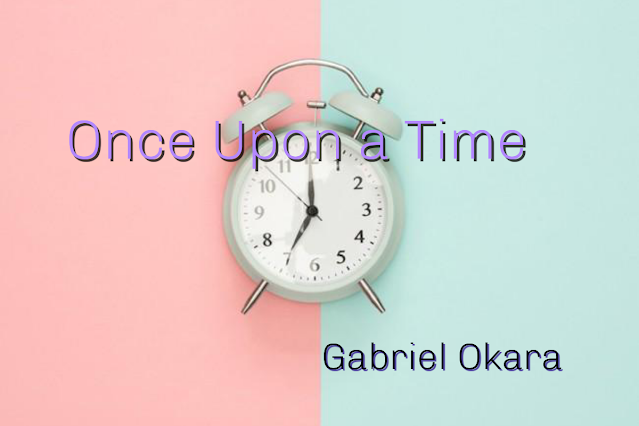Critical Analysis of the poem Once upon a Time by Gabriel Okara
Once upon a Time by Gabriel Okara
Gabriel Okara (1922-2019)
He was an African, Nigerian poet born in 1922, whose work has been translated into several languages. He is one of the founding members of Modern Nigerian and African literature along with Chinua Achebe. Furthermore, he has been called "the Nigerian Negritudist" as he was a strong supporter of the Nigritude movement. Negritude is a literary movement where many black writers join together to protect the cultural identity of black people. They stand for protecting the traditional culture of black people. He was famous for an experimental novel, The Voice. Apart from the novel and poem, he has also written two collections of children's poetry, Snake and Little frog (1992) and Adventure to Juju Island. The majority of Okara's works reflect African thought, religion, imagery and folklore. Once Upon a Time is a poem written in the context of Nigerian people and cultural change in their life after they meet Western culture.
Once Upon a Time Analysis.
This is the poem written in the context of Nigerian independence from Britain. Like India, Nigeria also was under the control of British rule during the time of colonialism. The British came to Nigeria and introduced their administration, religion, lifestyle, etc. Gradually they destroyed traditional Nigerian culture with Western culture. In this context, the poem exposes what happens to the traditional African culture when it meets with Modern Western culture.
After independence, Nigeria was a completely independent country; they have its own government. Nobody is going to control them. But they forgot their own culture, manners, religion, etc. Still, their mind is occupied by Western thoughts and beliefs. Here, Okara wants to regain or restore traditional culture. He is totally disappointed in the current situation of the Africans.
Okara compares the mentality of Africans before and after colonialism. People lost sincerity and openness, and everything looks artificial, no more original and natural. Okara says that most of the adults are hypocritic. They have different faces for different occasions, like homeface, officeface, streetface, hostface, cocktailface, etc. They change behaviour just like changing masks or dresses. Furthermore, they cheat, lie, and betray whereas childhood is the expression of honest and sincere laughter. Children are sincere because they are not corrupted by the current norms and manners of society. People are so eager to say Goodbye. Because they don't have much time to spend with others. People are learned to shake hands without heart. Every act of a human being became too mechanical.
In the last part of the poem, Okara says that I want to unlearn what is taught by society. I want to relearn traditional African manners and practices. So he asks his young son 'show me or teach me how to laugh and smile sincerely. "Once upon a Time I was just like you"
Once upon a Time is written in the mood or tone of nostalgia. Poet wishes to go back to his past and past Nigeria. Because there was true love, care, and compassion in the minds of people. He is no happier with the present society.
If we come up with the technical aspect, 'One upon a Time' is a poem of 43 lines with seven stanzas. Okara uses smilies in different lines. A simile is a figure of speech, a direct comparison of one thing with another thing of a different kind by using 'as' or 'like'. Example.
I have learned to wear many faces
like dresses- homeface,
Officeface, streetface, hostface..
This is a direct comparison of two things. He compares face with a dress. People change their behavior or face based on the situation just like changing our dress.
Summary of the poem, 'Once upon a Time'.
This is a poem written in the form of a conversation between a father and son. But the son is a silent listener. In the poem, the father talks about the past and present state of the Africans.
There was a time when people laugh with their hearts and eyes. But now they laugh with their teeth without any emotions.
The earlier time they shake hands with their hearts. Now the situation has changed. Now they shake hands without heart.
They are no more sincere while shaking hand their- left hand search our empty pocket.
When we visit relatives' houses, for the first time, you may feel homely. They may respect you, and comfort you. But when it repeats once or twice, there will not be thrice. Becausethe doors of the house will be closed for you.
Okara says that now he has learned to wear many faces like dresses. He wears homeface, officeface, hostface and cocktailface with an artificial smile.
Again he says that now I have learned to laugh with teeth and shake hands without heart.
And feel pleased to say goodbye because they don't have time to spend on others and learned to say 'glad to meet you' without being Glad. Started to say 'nice to talking to you at the end of their conversation after being bored.
In the next stanza, he says that believe me my son I am also used to laugh just like you in my past. Modern conventions and practices brought a change in my life. He wants to unlearn whatever he learned from modern society. He was so artificial and mechanical. He forgot how to laugh or smile sincerely. He is not able to laugh open-heartedly.
In the last stanza, he asks his son, teach me how to laugh and smile. There was a time when I used to laugh the same as you, but now I cannot laugh in such a way.
This is one of the best poems written by Gabriel Okara. It expresses his emotional bond with the traditional African culture.

Most of the teachers use to copy this
ReplyDelete